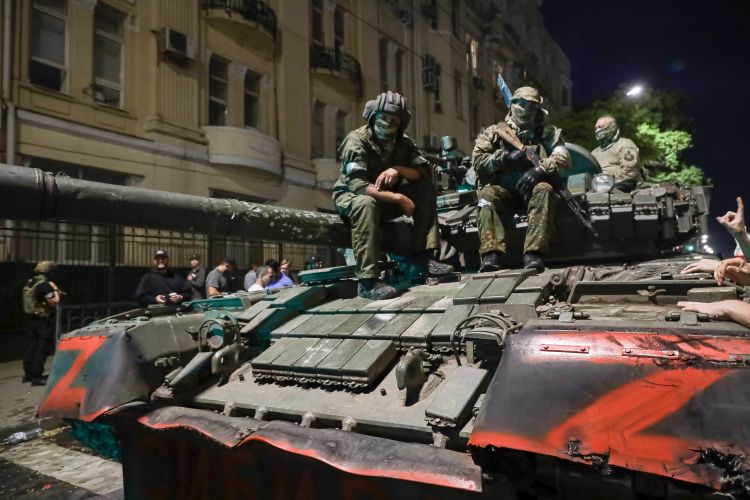Wagner's Attempted Mutiny Creates Danger — and Opportunity ...

Despite the deal with Lukashenko, it is difficult to see how Prigozhin survives with his status and power intact after embarrassing Putin and exposing the fissures in the highest ranks of the Russian state. And that raises the question of what the future of the Wagner Group will be. So while most of the focus in coming days is likely to be trained on events in Russia and Ukraine, we shouldn’t lose sight of the serious implications this episode is likely to have elsewhere, implications that the United States and its allies need to prepare for as quickly as possible.
The expectation is that Wagner forces in Ukraine are going to be integrated in the regular Russian military. But the Wagner Group operates worldwide — from the Middle East to Africa to Latin America. For years, Wagner has served as the tip of the spear for Russia’s foreign policy in countries from Syria to Sudan to Venezuela, even as it has long sought to maintain plausible deniability about the extent of its linkages to the Kremlin.
In Syria, Wagner has propped up the regime of Bashar al-Assad, supplying essential military force to help the dictator beat back the Islamic State and recapture important territory. In Libya, the guns for hire have backed warlord Khalifa Haftar, serving as a bulwark for the expansion of the Libyan National Army in its quest to prevail in that country’s civil war. In both cases, Wagner receives concessions from contracts related to oil and gas installations that the group helped seize and protect. These funds, as well as funds from extractive resources in Mali, Sudan, and the Central African Republic in the form of diamonds and gold have been helping the Kremlin evade sanctions.
If Wagner winds up being pulled out of some of the countries where it currently operates, that could create an opening for a U.S. diplomatic blitz to help figure out how to fill the resulting power vacuum and regain influence in those areas. In particular, there could be an opening in some African countries where Washington might be able to offer security cooperation or build partner capacity arrangements in exchange for pledges to move toward democratic or good governance initiatives. With China also making inroads into Africa, this is an opportunity the United States should not let pass.
If Wagner does withdraw from those countries, as many now expect, Putin and his inner circle may attempt to deploy another private military company in Wagner’s place. But that would likely take some time. In the meantime, the lag will offer terrorists and other insurgents opportunities to go on the offensive, which will breed further instability. Even if the U.S. prefers to move away from counterterrorism and toward great power competition, it can’t afford to let the situation in the Sahel and other areas grow less stable and more dangerous as a Wagner withdrawal allows the Islamic State and al-Qaeda affiliates to ramp up their own activities.
In many ways, Wagner’s presence in Africa and the Middle East has posed a Catch-22 for the countries where it operates — although its forces are invited in to stabilize fragile states, its actions often invite further instability, creating more opportunities and a greater demand for its services. If Wagner withdraws, there is a serious threat to some of the regimes that depend upon it for security and protection. This does offer an opportunity to the West, if countries like France and the United States are able to make some inroads with unstable regimes, particularly those in sub-Saharan Africa struggling with security.
Moreover, Wagner is not simply a mercenary group. Wagner has demonstrated effective expeditionary skills and logistical capabilities that many other mercenary organizations could not marshal, continuously diversifying its portfolio. Beyond the military training that Wagner provides, which includes conducting offensive combat operations and, in some cases, serving as regime security, the group also advises government leadership on political issues and conducts information operations campaigns. In both Madagascar and Mali, Wagner has engaged in election meddling and false accusations to cover up war crimes, utilizing Prigozhin’s Internet Research Agency.
If the United States and other western nations don’t step in, other actors will. The way Wagner has been used by the Russians could prove a highly attractive model for other countries to emulate. Wagner generates profits, operating through a series of shell companies it has invested in extractive industries across Africa, receiving access and rights to commodities in exchange for its security services. Wagner’s opaque structure allows it to carry out Russian foreign policy objectives while insulating Moscow from significant blowback — at least until recently.
Moscow has invested so much in the Wagner Group, that any change in the status quo will present major challenges to Putin’s regime. There are other second- and third-order effects likely to directly impact global stability, including new power vacuums likely to be filled by predatory states, particularly those capable of leveraging their own proxy networks.
Finally, Prigozhin’s mutiny has further exposed Russia as a second-rate power. Put simply, when we speak about great power competition, Russia doesn’t belong in the conversation. But a wounded and vindictive Russia could be a continued source of instability, as the Kremlin seeks new avenues for influence, upending security arrangements in fragile states that will be unable to recover easily. The result could be a more dangerous world, even if the danger no longer emanates from Russian mercenaries.
That’s a future that we should work to forestall, by acting quickly to reinforce the stability of regimes that may soon need to wean themselves off Wagner’s support.








































